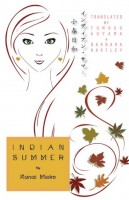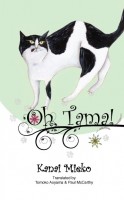 Author: Mieko Kanai
Author: Mieko Kanai
Translator: Tomoko Aoyama and Barbara Hartley
U.S. publisher: Cornell University East Asia Program
ISBN: 9781933947556
Released: August 2012
Original release: 1988
My introduction to Mieko Kanai was through her short novel Oh, Tama!, the second volume in her Mejiro series. I enjoyed it so much that I wanted to read more of her work, which is how I came to pick up Indian Summer. Although Indian Summer was Kanai’s first novel to be released in English, and only the second volume of hers to be translated (the first being the short story collection The Word Book), it’s actually the third book in the Mejiro series. Each novel in the Mejiro series, though they share some of the same characters, settings, and events, largely stands on its own. While it isn’t necessary to read one novel to enjoy another, it may add some additional depth. After being serialized between 1985 and 1987, Indian Summer was collected into a single volume with some slight modifications in 1988. The English translation of Indian Summer by Tomoko Aoyama and Barbara Hartley, published by Cornell University’s East Asia Program as part of its New Japanese Horizons series in 2012, is based on the later 1999 Japanese edition of the novel.
Momoko is a new student at a university in Tokyo. She’s looking forward to leaving her home in the country behind and setting out on her own in the city. Unfortunately, her overbearing mother isn’t about to let her nineteen-year-old daughter live unsupervised and plans for Momoko to stay with her aunt Chieko instead. The arrangement is meant to be temporary. In a year, Momoko’s younger brother Jun’ichi is also expected to be attending a Tokyo university and their mother intends for them to live together so that Momoko can look after him. Momoko isn’t at all interested in either of these plans, but happily she and her novelist aunt get along fairly well with each other. Chieko has her quirks, as does Momoko, but the two of them are doing what they can to make the best out of a rather awkward situation and to appease Momoko’s mother. Although the arrangement isn’t ideal, life does go on for Momoko as she beings university, makes friends (her classmate Hanako just so happens to be a huge fan of Chieko’s writing), and deals with any of the other curveballs that are thrown her way.
The structure of Indian Summer is particularly interesting. The novel is primarily told from Momoko’s point of view, but her narration is interspersed with the essays and stories that her aunt has written. Generally they are somehow related to whatever is currently going on in the story, but they do break it up somewhat. Much as in Oh, Tama!, Kanai frequently makes references to other works of literature as well as cinema in Indian Summer. Although I know there were some references that I didn’t recognize, I was delighted by those that I did, such as an homage of sorts to Nobuko Yoshiya’s Hana Monogatari. However, enjoyment of Indian Summer doesn’t depend on familiarity with the works being referenced, some of which are Kanai’s own. In Oh, Tama!, Kanai mentions that the characters in her Mejiro series are all based on real people. Indian Summer makes it fairly clear that she herself is at least partly if not primarily the inspiration for Chieko.
In Oh, Tama!, Momoko, Hanako, and Chieko were side characters. In Indian Summer, their roles are very much center stage. Momoko makes a genuinely appealing lead. She’s self-aware, a bit headstrong, forthright, and very capable of speaking her mind. Indian Summer, like Oh, Tama!, is lighthearted and humorous, focusing more on the characters themselves rather than on a complicated or involved plot. Not much actually happens in the novel. Mostly it’s about a young woman expressing herself and even venting a little as she deals with the very normal events in her life. Granted, while the actual events aren’t particularly unusual, the characters in Indian Summer all tend to be rather eccentric in one way or another. As Momoko begins to experience life away from home, the novel explores themes of family, interpersonal relationships, sexuality, and gender roles in a very amusing manner. Indian Summer was a wonderfully delightful and witty read. I can only hope that more of the Mejiro series will be translated in the future.

